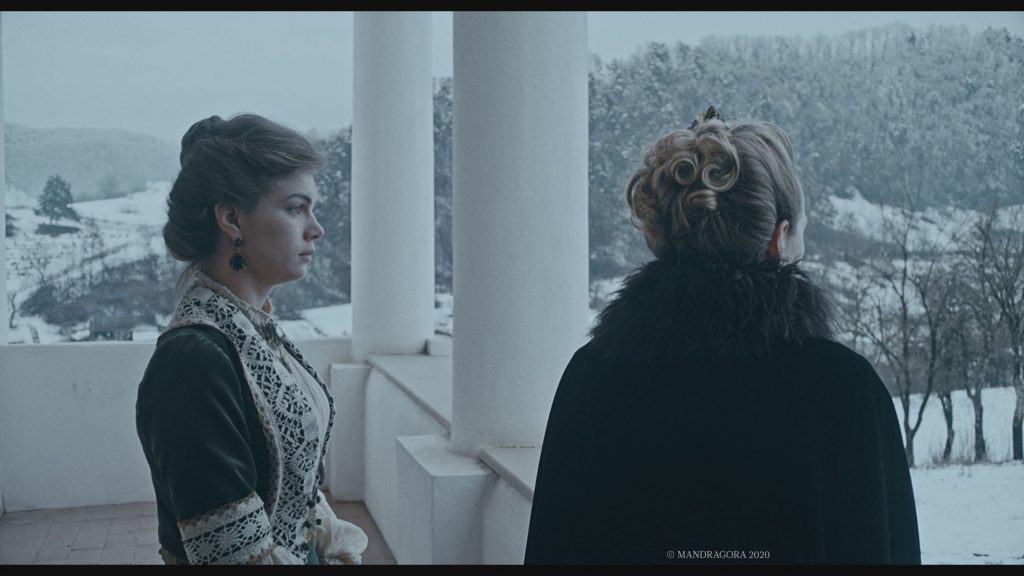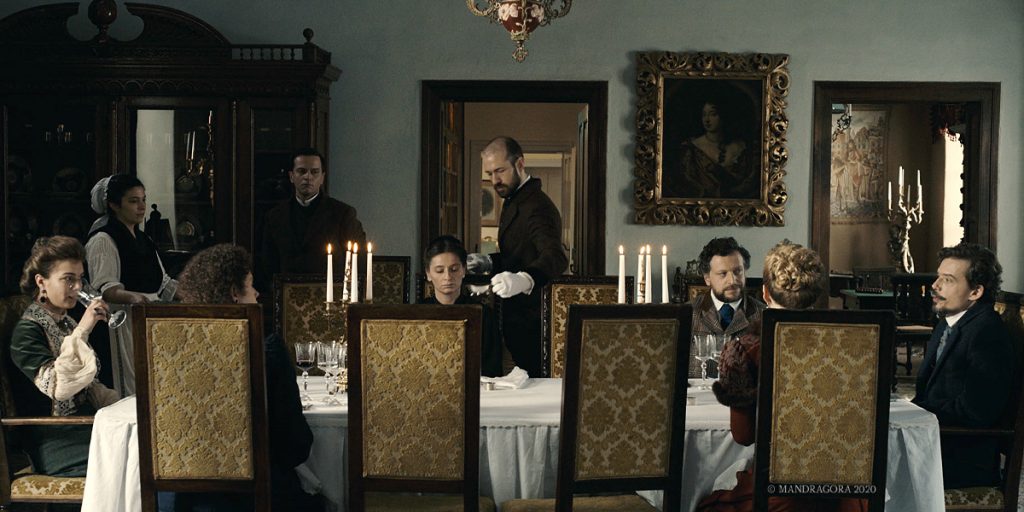A treatise on the Russian Revolution told in 200 minutes of brutally taxing philosophical discussion, Malmkrog uplifts and exhausts in equal measure.
It’s Christmas Eve at the turn of the 20th century, and a group of Russian aristocrats have gathered for dinner: nobles, diplomats, and military leaders. Throughout the night, their conversations (predominantly in French, but fluently spanning four different languages) about the morality of war, the European “civilisation” of Turkey, and the Antichrist move in turn from cerebral, hypothetical to visceral and bad-tempered. Ideas of intra-European wars are raised and laughed off over a glass of Cognac. Parables are told, re-told, re-phrased ad infinitum as each one of the nobles vigorously defends their own interpretation. Silently, the household staff move around them keeping their drinks well-stocked, while a dying count lies bleeding in his bed, babbling phrases from the Communist Manifesto to nobody in particular. This is how Malmkrog spends its behemothic 200-minute runtime.
One of the most striking aspects of Malmkrog is its mastery of its surroundings. Writer/director Cristi Puiu demonstrates what must be a nigh-obsessive perfectionism when it comes to mise-en-scène, all beautifully shot by cinematographer Tudor Panduru. Each of the film’s six “chapters”, all capturing different debates, is shot in a separate style, from a 15-minute-long single wide shot to a sequence of single-person close-ups. The first discussion moves freely around a lavish drawing-room as characters draw close and then split apart with highly starched precision. The Ophüls-like reverence to clever and naturalistic tracking shots meshes beautifully with the imperial Russian ostentation, and there is a constant temptation to simply let the scene overwhelm you.
However, Malmkrog abhors all but the most intense and whole-minded concentration. Conversation flits from subject to subject at such a rate that a few seconds lost leaves you at sea for the next several minutes, and so constant attentiveness is required to keep up. It is also unapologetically demanding in terms of historical, philosophical, and theological background information – many aspects of the conversation resolved themselves much more concretely for me following a Wikipedia article (or seven) after the film. It is fortunate that the tone is so consistently well-carried by the film’s exceptional ensemble cast. Barbs are thrown with a subtle, playful cruelty, and impassioned resolve is visible under a veneer of aristocratic repression. Agathe Bosch’s performance as Madeleine is a particular delight – consistently smirking wryly at companions’ arguments, her listening is as gripping to watch as her speaking.

Unfortunately, after more than three hours of this intense debate, one is left profoundly exhausted. Malmkrog is a supremely punishing watch, and its expectations of the audience give the impression more of a lecture than of entertainment. It is a work of titanic scale that confines itself to only a handful of locales and characters, and although its dialogue is at times inspired and enriching, it simply is not strong enough to resist collapsing under its own heft. I was reminded of parties where two friends would sit in a corner, not talking to anybody else, discussing some political point unceasingly for 45 minutes with no intention of ever conceding defeat; at some point, somebody needs to put on an ABBA song and drag them to their feet because they’re bringing the vibe of the room down.
Perhaps this was Puiu’s ultimate endeavour with this film. The upcoming Russian Revolution hangs, unspoken, like a dark cloud above these characters: a bedridden count muttering Marx while bathed; an almost furious silence and repression among the house staff; an inexplicable ten-second burst of gunfire halfway through the film that is brushed aside as quickly as it arose, never to be spoken of again. These figures are, we sense, debating and debating with themselves until they can crush themselves under the weight of their own discourse, while just beyond their view a storm gathers that prepares to drown them all. Occasionally, we snap out of the trance of stilted, sarcastic French pondering and suddenly see how these discussions crumble into nothingness, built upon foundations and assumed truths so unstable and porous that they collapse.
Ultimately, however, the thought of re-watching Malmkrog fills me with something approaching terror. This is a movie that you will probably already know your reaction to before the first act has drawn to a close. For those who swear allegiance to a particularly intellectual branch of cinema, the world of the most abstract works of Tarkovsky or Bergman, Malmkrog may be a revelation, a film that can be unpacked, unravelled, and pored over for years and years to come. To me, it stands as a haughtily brutal work, one that inspires and exhausts in equal measure. It is, no doubt, a cinematic accomplishment to be admired, but one that carries with it an enormous caveat: this is by no means an easy watching experience.
Malmkrog was released on 26th March, 2021, and is now available to watch on digital and on demand.

